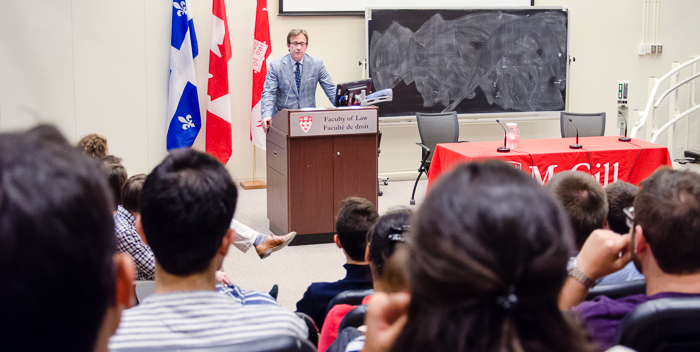
Supreme Court of Canada Justice Clément Gascon closed orientation week activities with a moving speech to students about the world of possibilities before them.
The newest member of the Supreme Court of Canada, Clément Gascon, BCL’81, paid a visit to McGill as this year’s orientation keynote speaker. The McGill Law Students’ Association (LSA) invited Mr. Justice Gascon, who graduated from the Faculty in 1981, to share his experience as a student at McGill and to reflect on his career trajectory so far.
Switching back and forth between English and French with ease in the trademark McGill Law style, Justice Gascon charmingly emphasized the ordinary, everyday nature of his personality and career, throughout his speech and the question and answer session that followed.
“I remember sitting in this Moot Court as a first-year law student in September 1978,” Gascon said. “I was 18, fresh out of CEGEP, young, naïve and one of 20-30 Francophones in an Anglophone environment for the first time in my life. If way back then, 36 years ago, someone had told me I would return as a justice of the Supreme Court of Canada, I would have laughed.”
Gascon remembers initially struggling in this new environment. “I remember my first lecture in this room: it was about the court structure in Canada and it was given by Professor Steven Scott, who is sitting here today. I was discouraged and felt like an idiot. I did not understand anything.”
He approached this challenge with a strategy of hard work and an even-keeled outlook that makes room for mistakes: “J’ai travaillé et je me suis fais confiance. On fait des erreurs au début; c’est normal.”
He extolled the academic training he received at the Faculty for its unique blend of languages and legal systems: “McGill vous apporte une diversité culturelle et linguistique inégalée et une approche académique que j’ai trouvé différent : on nous apprenait à penser, d’abord et avant tout.”
“You have the advantage of two systems and two languages. Use it,” he exhorted.
After graduating from the Faculty, Gascon spent 21 years at Heenan Blaikie in Montreal, choosing to work in litigation, he explained, because he liked “the challenge to persuade and to win a case. In litigation, you are always learning something new and always dealing with people.”
He was appointed to the Quebec Superior Court in 2002, the Quebec Court of Appeal in 2012 and to the Supreme Court of Canada in June 2014. Speaking from his experience in the judiciary, Gascon expressed concern for future generations’ access to justice.
“The legal profession is supposed to offer a service to society,” he said. “In the judiciary, we see a serious problem of access to justice. Most people cannot afford a lawyer and your generation will be tasked to figure it out.”
He called for creativity in looking at how law firms can be run and pushed back against the commercialization of the profession: “The mercantile aspect of the law needs to be rethought,” he said. “If you want to be a millionaire, maybe you should go into business.”
At the age of 54, Gascon is the youngest of the current Supreme Court justices, and he noted that this continues a trend in his career: “J’étais le plus jeune à McGill, le plus jeune à Heenan…” Surprisingly, the rapidity of his career trajectory was the one thing about which Gascon expressed regret, saying if he could do it over again, he would have taken more time.

The other tenets of his career, however, would remain unchanged.
Hard work and the ability to communicate are crucial to success: “Preparation is one thing, but to persuade, you also need to be concise,” he said. “You need to know the file better than the client, the facts better than the witnesses and the law better than your opponents.”
Integrity and credibility are non-negotiable: “You build credibility from day one, and aggressivity with witnesses and opponents seldom if ever pays,” he said, adding that the competitive demands of litigation can be met in a civil manner: “You have to kill with kindness.”
Gascon opened and closed his talk with the same message, that humility and dedication open doors to great possibilities. “Il n’y a rien d’exceptionnel dans mon cheminement, mais il vous montre qu’il n’y a rien d’impossible.”
